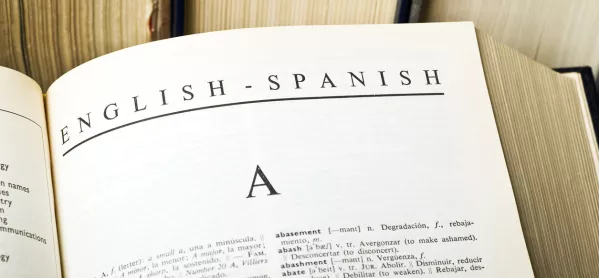Pupils with English as a second language are disadvantaged by the need to use complex vocabulary in science tests because they cannot express their understanding fully, new research warns.
The study found that pupils with English as an additional language performed less well than their native English-speaking peers in standardised science assessments. They were particularly disadvantaged by questions that required extended writing or specific scientific vocabulary.
Related: Learning maths in a foreign language ‘boosts MFL grades’
News: Many EAL pupils outperform native English peers
Quick-read: Gauging EAL pupils’ English ability ‘vital’
“These conclusions lead us to suggest that ELLs [pupils with English as a second language] may often possess the intended underlying scientific understanding but lack the required vocabulary and language skills to demonstrate it appropriately during assessment,” said Oksana Afitska, one of the researchers who worked on the study.
In one assessment, pupils were asked to give a feature of a penguin that helped it to adapt to its environment.
Science barrier for EAL students
One pupil with English as a second language wrote “a fluffy tummy to help keep it warm” but was awarded no marks because they did not use the required answers, which included “thick feathers” or “fur/hair/thick coat”.
“The consequences of poor performance in these tests are highly significant for a learner,” the report adds.
The researchers said lower test scores could limit pupils’ opportunities in future, affecting their perceptions of themselves as science, English and maths learners, or causing them to be streamed into a lower-ability group.
The research - conducted by Dr Afitska of Lancaster University and Timothy Heaton from the University of Sheffield - studied 485 UK pupils, both native speakers and those with English as an additional language, aged 7 to 11.
Dr Afitska and Dr Heaton suggested teachers could include a wider range of language that can be used in required answers to make science assessment more equitable between native and non-native speakers, “clearly separating assessment of scientific language and science ideas”.
The researchers said the need to communicate through highly specific subject terminology was something that all pupils struggled with in science, including native speakers.
And they said teachers could address this inequality by developing EAL pupils’ abilities to use and recognise formal scientific vocabulary.
“Addressing this issue is, therefore, a key step if we wish to tackle the current under-representation of linguistically diverse learners in Stem postsecondary education,” the report says.




